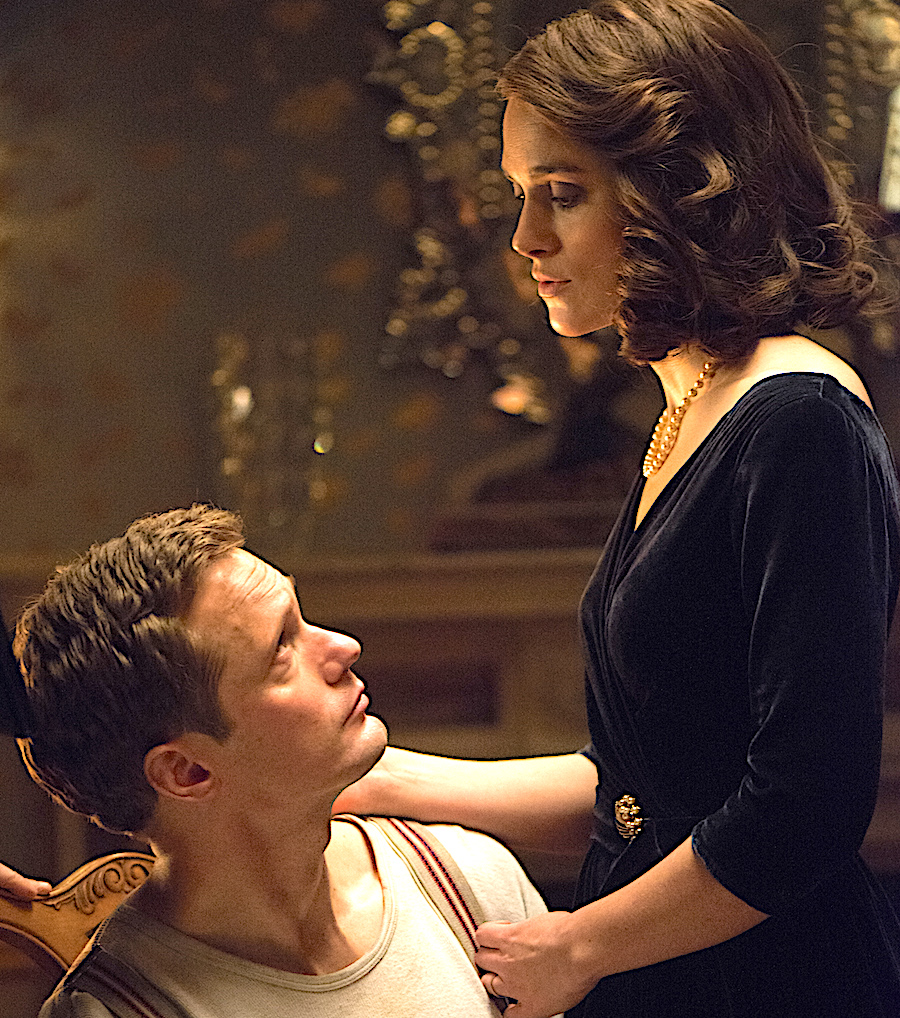Is it time for the rebirth of the old-fashioned wartime weepie? If so, this time next year The Aftermath will be dragging a clanking heap of statuettes round Hollywood, attached to the rear bumper of its 1940s army staff car. If not…
A cynical person might summarise this movie as Brief Encounter Goes to the Third Reich, in which we find Rachael Morgan (a translucent Keira Knightly) stepping off a train in the bomb-flattened wasteland of Hamburg in late 1945, where she’ll meet her husband, British army colonel Lewis Morgan (stoical Jason Clarke, pictured below with Knightley). It’s a few months after the end of the war, and Lewis is in charge of getting the devastated city back on its feet.
 Director James Kent has adapted the story from Rhidian Brook’s novel, with help from screenwriters Joe Shrapnel and Anna Waterhouse, and they’ve devised a straightforward narrative unfashionably determined to avoid ingenious twists or murky secrets. The plot doesn’t make you wonder what’s going to happen so much as draw you into the emotional states of the characters to reveal why they act as they do.
Director James Kent has adapted the story from Rhidian Brook’s novel, with help from screenwriters Joe Shrapnel and Anna Waterhouse, and they’ve devised a straightforward narrative unfashionably determined to avoid ingenious twists or murky secrets. The plot doesn’t make you wonder what’s going to happen so much as draw you into the emotional states of the characters to reveal why they act as they do.
Kent scores strongly with design and cinematography, sustaining a powerful mood of wintry melancholy which looms oppressively over the characters. Images of a steam train chugging its way through snowbound countryside and glimpses of a misty, sullen-looking River Elbe establish the emotional climate of the shattered city, which is an endless expanse of rubble and ruined buildings through which the survivors pick with a demoralised doggedness. The civilian population are having to survive on meagre rations, prompting intermittent food riots, while a group of Nazi fanatics (identified by the "88" branded on their arms) launch sudden attacks on British soldiers.
However, at least the Morgans can escape from all this to their luxurious quarters, a palatial house on the banks of the Elbe requisitioned from a German architect, Stephan Lubert (Alexander Skarsgård). He’s still living in the house with his teenage daughter Freda (Flora Thiemann). Colonel Morgan being an upstanding chap who apparently bears no ill-will towards the Germans, despite having fought his way through Europe – his British colleagues call him “Lawrence of Hamburg” – suggests to his wife that they allow the Luberts to stay in the house rather than be taken to an internment camp, since the building is easily big enough for all of them. The idea of shacking up with the enemy causes Rachael to react with an instinctive shudder of horror, even though Herr Lubert is extremely handsome and chivalrous to a fault. However, she grudgingly goes along with it (pictured below, Skarsgård and Knightley).
 Inevitably, with time and close proximity her attitude begins to change, especially as her husband is wholly preoccupied with his military duties. Rachael encourages Freda to play the family piano, even though it’s in the Morgans’ sector of the house, and gets her hairdresser to perform an upgrade on Freda’s Heidi-style pigtails. Meanwhile, she can tell from Stephan’s soulful blue eyes and distracted demeanour that he is a man who has known sorrow (his wife was killed in the RAF’s air raids). Rachael herself, as it happens, is tormented by her own inner misery, and it all starts pouring out as she plays Debussy’s Claire de Lune on the piano. You can guess the rest.
Inevitably, with time and close proximity her attitude begins to change, especially as her husband is wholly preoccupied with his military duties. Rachael encourages Freda to play the family piano, even though it’s in the Morgans’ sector of the house, and gets her hairdresser to perform an upgrade on Freda’s Heidi-style pigtails. Meanwhile, she can tell from Stephan’s soulful blue eyes and distracted demeanour that he is a man who has known sorrow (his wife was killed in the RAF’s air raids). Rachael herself, as it happens, is tormented by her own inner misery, and it all starts pouring out as she plays Debussy’s Claire de Lune on the piano. You can guess the rest.
It’s a treat for anyone who fancies a discreet sob, and the lead performances are reliably solid, though Clarke is wasted by being confined to portraying an unshakeable pillar of decency. The Aftermath ultimately suffers from being far too uncritical of itself. The Morgans’ relationship is left largely blank for most of the running time, while it’s unclear how Lubert managed to remain in his gorgeous and completely undamaged home while his fellow countrymen were being slaughtered, de-housed or conscripted into the Fuhrer’s increasingly desperate forces. Especially as it’s taken entirely for granted that he’s a “good” German who never joined the Nazi party. The film takes a censorious view of Colonel Lewis’s colleague Burnham (Martin Compston), who’s angry and hostile towards the Germans, but that was surely how a lot of the British would have felt at the time.
It’s a good-looking production, but it’s a bit of a fairytale.















Add comment